Mold & Dust Mites Love Humid Basements!
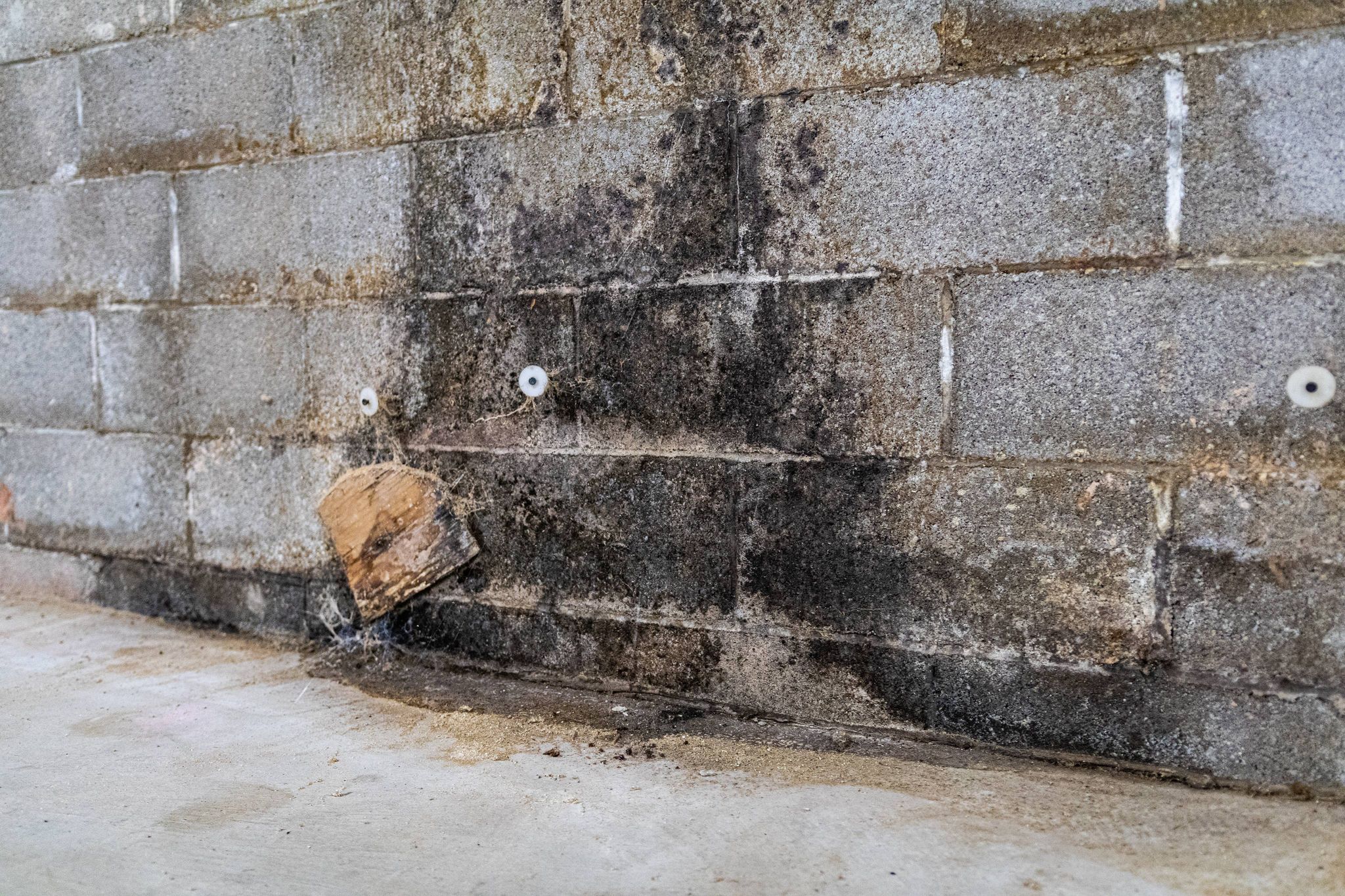
Every time the relative humidity levels in your basement are at or above 60%, the perfect environment for mold and dust mites to thrive is created.
Even when you are not seeing it anywhere, that typical, musty basement smell indicates the presence of mold. Dust mites are equally invisible but their airborne droppings, along with the mold spores, will negatively impact your indoor air quality.
According to the CDC, dust mite droppings and mold spores are the two major causes of indoor allergies, and it is a mistake to think that these harmful particles will somehow stay confined to the basement. The air in any house moves upwards. It is sucked from the lower levels of the building — namely the basement – and escapes through the upper levels. That means that at any given time, 1/3 of the air you breathe is basement air.
Get Rid of Smells & Allergens by Getting Rid of Moisture!
Of the three things that allow mold and dust mites to grow: warmth, organic matter such as household dust, and moisture, there is only one you can fully and successfully control: moisture levels.
Running a good basement dehumidifier to keep relative humidity levels under 60% will cause any existing mold and dust mites to dry out and stop releasing droppings and spores and will filter any impurities out of the air. As a result you will have a fresh smelling and Healthy Basement.
Healthy Basement Certificate Level 5
WiseAire 100. The Mold & Moisture Buster.
The WiseAire 100 is the ultimate dehumidification system for your basement. It is a superior alternative to the generic hardware store models because it is specifically designed to perform in basement environments. It monitors RH levels and runs automatically as needed. It removes up to 100 pints of water per day yet you never have to empty it because the WiseAire 100 self-empties into the sump pit. It is also energy efficient which will help you save money.
- Removes up to 100 pints of water per day
- Powerful dehumidification for basements up to 3200 sq. ft.
- Energy Efficient. Save up to $193 yearly on your electric bills versus using a portable dehumidifier
- Low Maintenance. Operates automatically and self-drains into a sump pit.
- Impressive 5-Year Warranty!
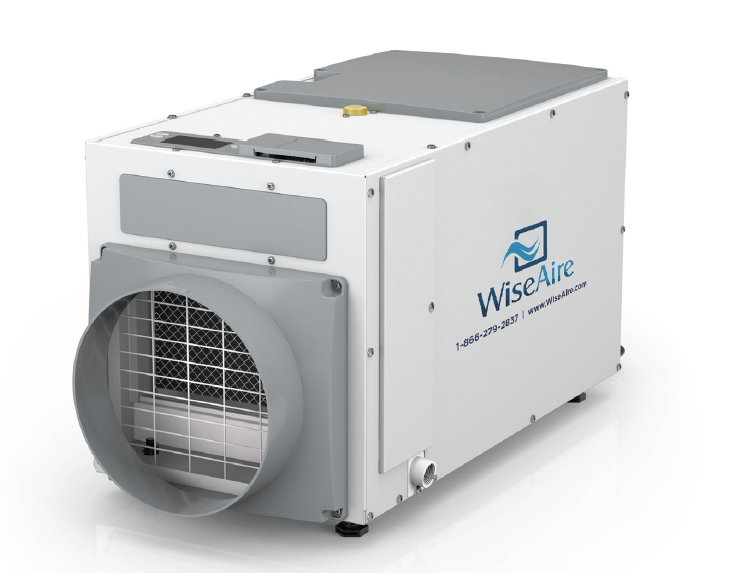
FAQ
Why does my basement smell musty?
That infamous musty odor indicates the presence of mold in your basement, even of you can’t see mold spots yet. Mold is a smelly fungus that loves damp and dark environments like a basement. Even in small concentrations it still releases spores and odors in the air.
Is mold in the basement dangerous?
Only a few species of mold, such as black mold, produce hazardous mycotoxins that can trigger serious health problems. Yet, every species of mold growing indoors releases spores which, in high concentrations, will negatively impact indoor air quality. This can trigger mild to sever allergy symptoms in sensitive people.
How to clean up mold in my basement?
If you have a visible mold infestation in your basement, start by getting rid of all the moldy items. Cardboard, paper, fabrics, upholstery, wood, drywall, and insulation must be removed and properly discarded. You can then clean mold from the walls and other hard surfaces using these CDC guidelines. https://www.cdc.gov/mold/mold-cleanup-bleach.html
How to get rid of basement mold?
The most effective way to permanently kill mold and keep it from growing back is to always keep the relative humidity levels in the basement below 60%. That can be accomplished by running a good basement dehumidifier that will constantly monitor RH levels and run as needed if the levels are too high.
What are those stains in my basement wall?
Stains in basement walls can have different causes. Some stains are mold. Others, like rusty-colored stains, can indicate the presence of iron ochre in the groundwater. A white, powdery substance covering the walls can be efflorescence. Basement wall stains usually are a sign of water seepage, and that your basement would benefit from drainage improvements.
iBasement Systems & Crawl Space Systems Certificates
The iBasement Systems and Crawl Space Systems Certificates were created using specific sets of criteria to provide a healthy indoor living environment. Air pollutants and excessive moisture levels in the basement or crawl space can negatively impact the odors in the home as well as cause health problems with those who live there year-round - including yourself!
We offer 6 levels of iBasement Certificate, and 5 levels Crawl Space Systems Certificate, each designed to solve specific problems and protect your home, family, and property value on the long run.
Steps towards a healthy basement and a Nationally Backed Warranty.
All of our Healthy Basement / Crawl Space Contractors are trained and certified.
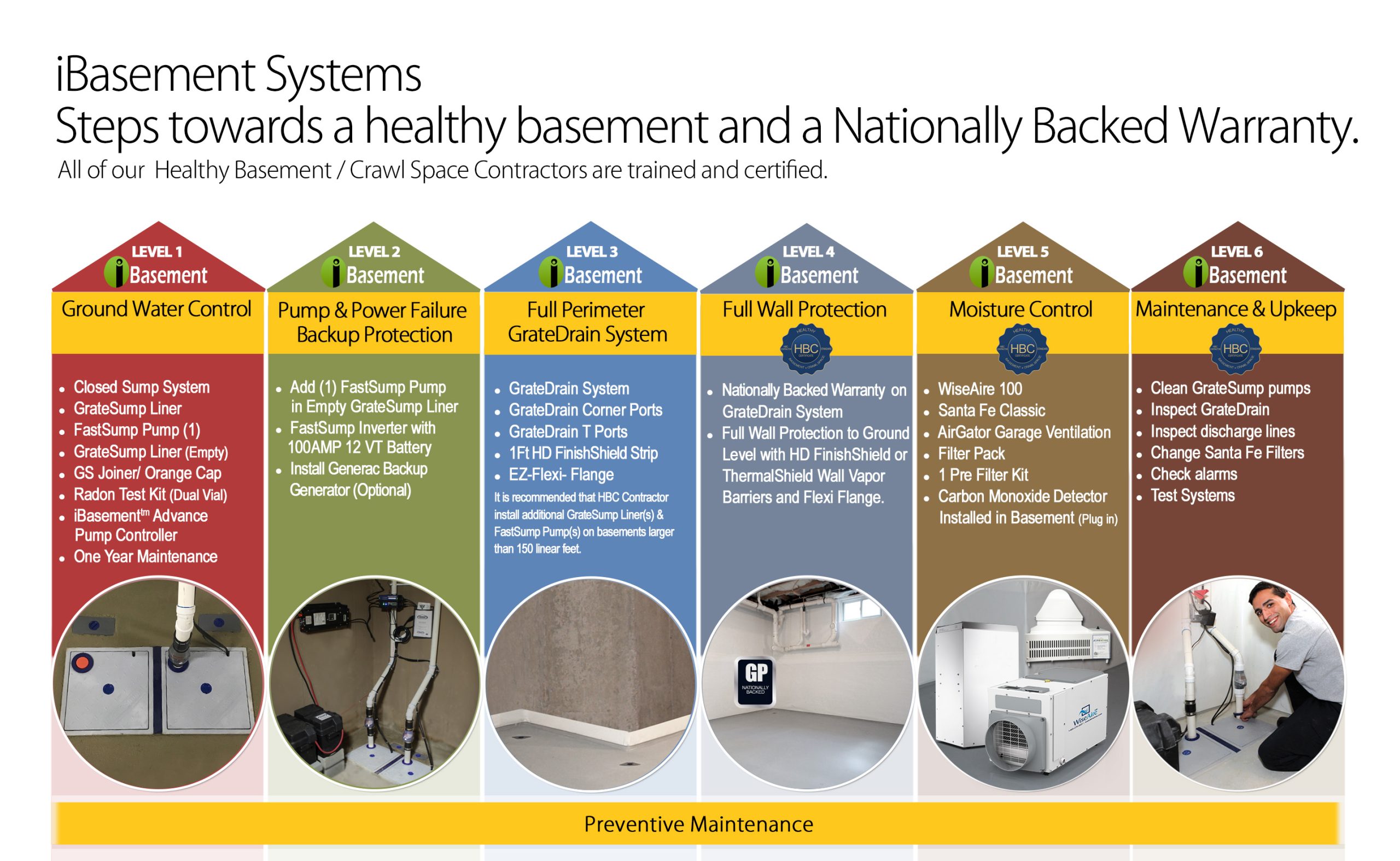
Steps towards a healthy crawl space and a Nationally Backed Warranty.
All of our Healthy Basement / Crawl Space Contractors are trained and certified.
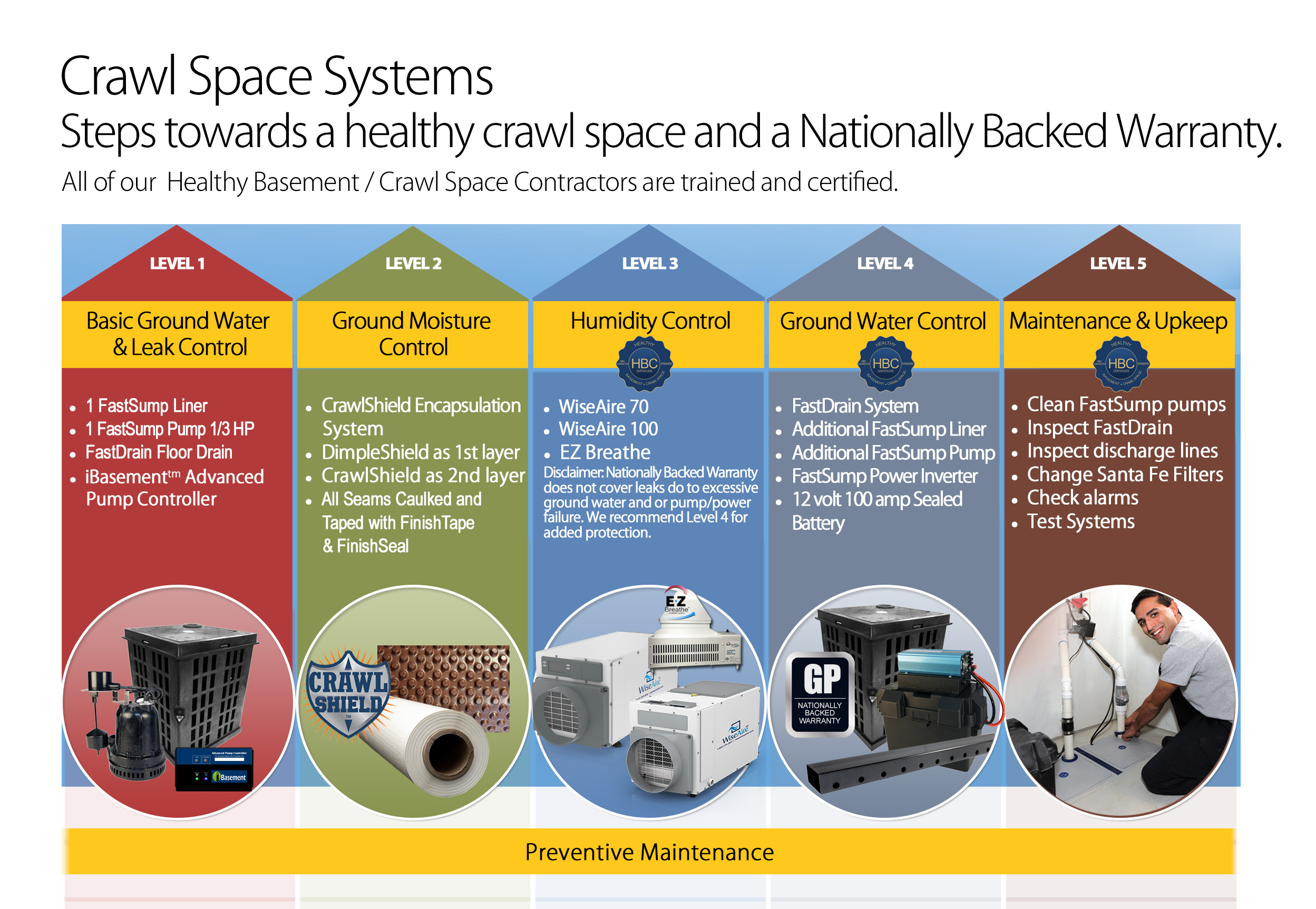
Why does my basement smell musty?
That infamous musty odor indicates the presence of mold in your basement, even of you can’t see mold spots yet. Mold is a smelly fungus that loves damp and dark environments like a basement. Even in small concentrations it still releases spores and odors in the air.
Is mold in the basement dangerous?
Only a few species of mold, such as black mold, produce hazardous mycotoxins that can trigger serious health problems. Yet, every species of mold growing indoors releases spores which, in high concentrations, will negatively impact indoor air quality. This can trigger mild to sever allergy symptoms in sensitive people.
How to clean up mold in my basement?
If you have a visible mold infestation in your basement, start by getting rid of all the moldy items. Cardboard, paper, fabrics, upholstery, wood, drywall, and insulation must be removed and properly discarded. You can then clean mold from the walls and other hard surfaces using these CDC guidelines. https://www.cdc.gov/mold/mold-cleanup-bleach.html
How to get rid of basement mold?
The most effective way to permanently kill mold and keep it from growing back is to always keep Relative Humidity Levels in the basement below 60%. That can be accomplished by running a good basement dehumidifier that will constantly monitor RH levels and run as needed of the levels are too high.
What are those stains in my basement wall?
Stains in basement walls can have different causes. Some stains are mold. Others, like rusty-colored stains can indicate the presence of iron ochre in the groundwater, and a white, powdery substance covering the walls can be efflorescence. Basement wall stains usually are a sign of water seepage, and that your basement would benefit from drainage improvements.
What Our Customers Say About Us
Accreditations

Angie’s List Super Service Award 2016

Home Advisor Screened & Approved

Basement Health Association Member

Better Business Bureau Rating A+
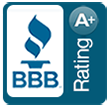
BestPickReport.com -4th year as a Best Pick!
Service Area
Pioneer Basement offers a variety of services from waterproofing to foundation repairs. We offer the following services in your area, basement waterproofing, crawl space encapsulation, sump pump installation and service, basement crack repair, vapor barriers and moisture control.

